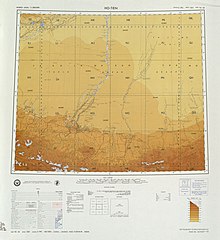Pa-ch'u
Appearance
English
[edit]
Etymology
[edit]From Mandarin 巴楚 (Bāchǔ), Wade–Giles romanization: Pa¹-chʻu³.
Proper noun
[edit]Pa-ch'u
- Alternative form of Bachu (Maralbexi)
- 1944, Martin R. Norins, Gateway to Asia: Sinkiang, Frontier of the Chinese Far West[2], John Day Company, →OCLC, page 109:
- Flourishing cotton fields abound also at So-ch'e, Maralbashi (Pa-ch'u), Shan-shan, Su-lo, and Korla.
- 1987, Arthur C. Hasiotis, Jr., Soviet Political, Economic, and Military Involvement in Sinkiang from 1928 to 1949[3], Garland Publishing, →ISBN, →LCCN, →OCLC, pages 102–103:
- In September of 1937, two regiments of Soviet Kirghiz troops and one regiment of Russian troops equipped with forty airplanes and twenty tanks entered Sinkiang from Atushe and attacked Pa-ch'u, dividing Ma Hu-shan's 36th Corps into two sections. In October one Kirghiz regiment entered P'i-shan, and Ma Hu-shan fled to India. Kirghiz and Russian forces were now in occupation of Hami and poised to strike at Ho-t'ien in the extreme south of Sinkiang.
- For more quotations using this term, see Citations:Pa-ch'u.
Translations
[edit]Bachu — see Bachu
